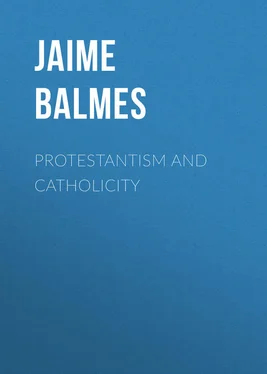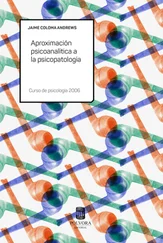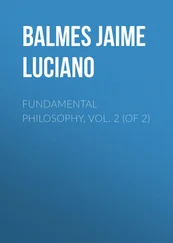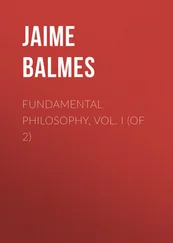Jaime Balmes - Protestantism and Catholicity
Здесь есть возможность читать онлайн «Jaime Balmes - Protestantism and Catholicity» — ознакомительный отрывок электронной книги совершенно бесплатно, а после прочтения отрывка купить полную версию. В некоторых случаях можно слушать аудио, скачать через торрент в формате fb2 и присутствует краткое содержание. Жанр: foreign_antique, foreign_prose, на английском языке. Описание произведения, (предисловие) а так же отзывы посетителей доступны на портале библиотеки ЛибКат.
- Название:Protestantism and Catholicity
- Автор:
- Жанр:
- Год:неизвестен
- ISBN:нет данных
- Рейтинг книги:3 / 5. Голосов: 1
-
Избранное:Добавить в избранное
- Отзывы:
-
Ваша оценка:
- 60
- 1
- 2
- 3
- 4
- 5
Protestantism and Catholicity: краткое содержание, описание и аннотация
Предлагаем к чтению аннотацию, описание, краткое содержание или предисловие (зависит от того, что написал сам автор книги «Protestantism and Catholicity»). Если вы не нашли необходимую информацию о книге — напишите в комментариях, мы постараемся отыскать её.
Protestantism and Catholicity — читать онлайн ознакомительный отрывок
Ниже представлен текст книги, разбитый по страницам. Система сохранения места последней прочитанной страницы, позволяет с удобством читать онлайн бесплатно книгу «Protestantism and Catholicity», без необходимости каждый раз заново искать на чём Вы остановились. Поставьте закладку, и сможете в любой момент перейти на страницу, на которой закончили чтение.
Интервал:
Закладка:
What have those geniuses who have descended to the foundations of science, and risen by the boldest flights to the loftiest speculations, told us? After having reached the utmost limits of the space which it is permitted to the human mind to range over, – after having trodden the most secret paths of science, and sailed on the vast ocean of moral and physical nature, the greatest minds of all ages have returned dissatisfied with the results. They have seen a beautiful illusion appear before their eyes, – the brilliant image which enchanted them has vanished; when they thought they were about to enter a region of light, they have found themselves surrounded with darkness, and they have viewed with affright the extent of their ignorance. It is for this reason that the greatest minds have so little confidence in the strength of the human intellect, although they cannot but be fully aware that they are superior to other men. The sciences, in the profound observation of Pascal, have two extremes which meet each other: the first is, the pure natural state of ignorance in which men are at their birth; the other extreme is, that at which great minds arrive when, having reached the utmost extent of human knowledge, they find that they know nothing, and that they are still in the same state of ignorance as at first. ( Pensées , 1 partie, art. 6.)
Catholicism says to man, "Thy intellect is weak, thou hast need of a guide in many things." Protestantism says to him, "Thou art surrounded by light, walk as thou wilt; thou canst not have a better guide than thyself." Which of the two religions is most in accordance with the lessons of the highest philosophy?
It is not, therefore, surprising that the greatest minds among Protestants have all felt a certain tendency towards Catholicism, and have seen the wisdom of subjecting the human mind, in some things, to the decision of an infallible authority. Indeed, if an authority can be found uniting in its origin, its duration, its doctrines, and its conduct, all the characteristics of divinity, why should the mind refuse to submit to her; and what has it to gain by wandering, at the mercy of its illusions, on the most serious subjects, in paths where it only meets with recollections of errors, with warnings and delusions?
If the human mind has conceived too great an esteem for itself, let it study its own history, in order to see and understand how little security is to be found in its own strength. Abounding in systems, inexhaustible in subtilties; as ready in conceiving a project as incapable of maintaining it; full of ideas which arise, agitate, and destroy each other, like the insects which abound in lakes; now raising itself on the wings of sublime inspiration, and now creeping like a reptile on the face of the earth; as able and willing to destroy the works of others, as it is impotent to construct any durable ones of its own; urged on by the violence of passion, swollen with pride, confounded by the infinite variety of objects which present themselves to it; confused by so many false lights and so many deceptive appearances, the human mind, when left entirely to itself, resembles those brilliant meteors which dart at random through the immensity of the heavens, assume a thousand eccentric forms, send forth a thousand sparks, dazzle for a moment by their fantastic splendour, and disappear without leaving even a reflected light to illuminate the darkness.
Behold the history of man's knowledge! In that immense and confused heap of truth, error, sublimity, absurdity, wisdom, and folly, are collected the proofs of my assertions, and to that do I refer any one who may be inclined to accuse me of having overcharged the picture. 7 Конец ознакомительного фрагмента. Текст предоставлен ООО «ЛитРес». Прочитайте эту книгу целиком, купив полную легальную версию на ЛитРес. Безопасно оплатить книгу можно банковской картой Visa, MasterCard, Maestro, со счета мобильного телефона, с платежного терминала, в салоне МТС или Связной, через PayPal, WebMoney, Яндекс.Деньги, QIWI Кошелек, бонусными картами или другим удобным Вам способом.
CHAPTER V.
INSTINCT OF FAITH IN THE SCIENCES
The truth of what I have just advanced with respect to the weakness of our intellect, is proved by the fact that the hand of God has placed at the bottom of our souls a preservative against the excessive changeability of our minds, even in things which do not regard religion. Without this preservative all social institutions would be destroyed, or rather never would have had existence; without it the sciences would not have advanced a step, and when it had disappeared from the human heart, individuals and society would have been swallowed up by chaos. I allude to a certain tendency to defer to authority – to the instinct of faith , if I may so call it – an instinct which we ought to examine with great attention, if we wish to know any thing of the human mind, and the history of its development.
It has often been observed that it is impossible to comply with the most urgent necessities, or perform the most ordinary acts of life, without respecting the authority of the statement of others; it is easy to understand that, without this faith, all the treasures of history and experience would soon be dissipated, and that even the foundation of all knowledge would disappear.
These important observations are calculated to show how vain is the charge against the Catholic religion, of requiring nothing but faith; but this is not my only object here; I wish to present the matter under another aspect, and place the question in such a position as to make this truth gain in extent and interest, without losing any thing of its immovable firmness. In looking over the history of human knowledge, and glancing at the opinions of our contemporaries, we constantly observe that the men who boast the most of their spirit of inquiry and freedom of thought, only echo the opinions of others. If we examine with attention that great study which, under the name of science, has made so much noise in the world, we shall observe that it contains at bottom a large portion of authority; and that if a perfectly free spirit of inquiry were to be introduced into it, even with respect to points of pure reason, the greatest part of the edifice of science would be destroyed, and very few men would remain in possession of its secrets.
No branch of knowledge, whatever may be the clearness and exactitude of which it boasts, is an exception to this rule. Do not the natural and exact sciences, rich as they are in evident principles, rigorous in their deductions, abounding in observation and experience, depend, nevertheless, for a great many of their truths, upon other truths of a higher nature; the knowledge of which necessarily requires a delicacy of observation, a power of calculation, a clear and penetrating coup d'œil , which belongs to few?
When Newton proclaimed to the scientific world the fruit of his profound calculations, how many of his disciples could flatter themselves that they were able to confirm them by their own convictions? I do not except from this question many of those who, by laborious efforts, had been able to comprehend something of this great man; they had followed the mathematician in his calculations, they had a full knowledge of the mass of facts and experience which the naturalist exposed to their view; they had listened to the reasons on which the philosopher rested his conjectures; in this way they thought that they were fully convinced , and that they did not owe their assent to any thing but the force of reason and evidence. Well, take away the name of Newton, efface from the mind the profound impression made by the authority of the man who made so extraordinary a discovery, and has employed so much genius in supporting it, – take away, I repeat it, the shade of Newton, and you will directly see, in the minds of his disciples, their principles vacillate, their reasonings become less convincing and exact, and their observations appear less in accordance with the facts. Then, he who thought himself a perfectly impartial observer, a perfectly independent thinker, will see and understand to how great an extent he was enthralled by the force of authority, by the ascendency of genius; he will find that, on a variety of points, he assented without being convinced ; and that, instead of being a perfectly independent philosopher, he was only an obedient and accomplished pupil.
Читать дальшеИнтервал:
Закладка:
Похожие книги на «Protestantism and Catholicity»
Представляем Вашему вниманию похожие книги на «Protestantism and Catholicity» списком для выбора. Мы отобрали схожую по названию и смыслу литературу в надежде предоставить читателям больше вариантов отыскать новые, интересные, ещё непрочитанные произведения.
Обсуждение, отзывы о книге «Protestantism and Catholicity» и просто собственные мнения читателей. Оставьте ваши комментарии, напишите, что Вы думаете о произведении, его смысле или главных героях. Укажите что конкретно понравилось, а что нет, и почему Вы так считаете.












